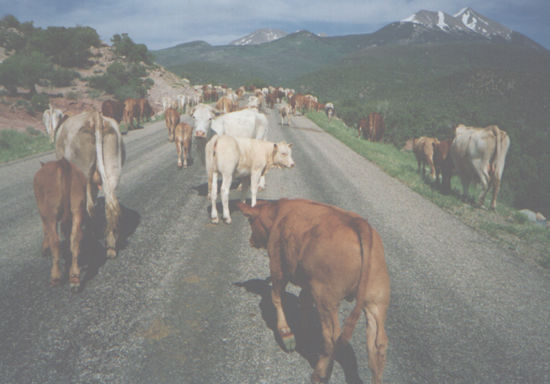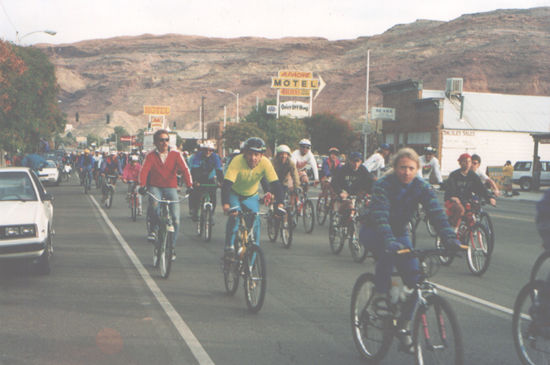

Everyone notices population. Some think about it, others just see roads getting more crowded. Population is about a place--we'll notice longer lines at the store, a longer wait for a table, maybe a new tram being built at the edge of town. And population is something we view in a relative way--some writers in these pages think Moab is becoming a metropolis, while most suburbanites would think it might as well be the Moon.
Like many readers of the Zephyr, I spend time thinking about population and the West. And where I live is a good place to think about it. Napa Valley is an in-between place, not the "wide open" Colorado Plateau but hardly the epicenter of the California horror.
Here in Calistoga we have vineyards instead of condos, places to drive our convertibles not merely commute with them, and rock formations that would impress anyone who has never been to Southern Utah. But every weekend in town here is as jammed as Jeep Safari, it's only fourteen miles to the LA microcosm of Santa Rosa, and half a million dollars might get you a house.
Tourists think this a near paradise. For many locals, it's an ex-paradise. With the right kind of eye, it's easy to glance across the Vaca Mountains to the East and see not the Sacramento Valley, as geography would indicate, but places like Sedona, Telluride, Taos, and Springdale.
No doubt, some readers would think of these towns as overpopulated four corners hellholes. But not readers where I live. It is important in understanding population issues, especially in the West, to understand the relative appeal of place. New Americans come from Southeast Asia to LA to find a better place. Southern Californians migrate to California's less touched valleys and mountains because they are better places. Many of us, precisely because these less touched Californian places are losing their appeal, are headed your way. And what may be hard to believe, this inter-mountain West migration has barely begun.
Assumption: A Demographic Disaster Awaits
The 1960s-1970s vision of apocalypse is wrong. The future is not The Population Bomb, Soylent Green, or Logan's Run. We won't be living a Calcutta lifestyle, eating recycled human flesh, or killing people who turn 30. If you doubt the power of technology to give a growing population more food, better health care, and plenty of energy, you're in for a pleasant surprise. But there, the good news ends.
Demographic disaster need not be a Malthusian tale of death. What we have in store is a kinder, gentler disaster, but a terrible prospect nonetheless. We are headed toward a world missing space, quiet, nature, and the sense of historical and geohistorical time we get from less altered places. I'll leave the meaning of the West to writers past and present who often are subjects in the Zephyr. Here, I'll assume that the reader shares my view that population represents, at least, a cultural disaster in the West. Let's first look at what we're not talking about.
Population In Rich Places Is A Social Not Biological Problem
A biological population problem deals with objective, scientific limits. An example is carrying capacity. The Manti-La Sal National Forest can support a certain number of fir trees or bears. Exceed the number and nature quickly restores equilibrium through competition, attrition, illness, and death. Certainly, Earth has a limited carrying capacity, a biological limit. There is only so much possible photosynthesis that can occur on this planet, for instance. The well known 1970s book The Limits To Growth is an example of this view of the population issue.
However, when we talk about population in our Western backyard, we're rarely talking about objective limits. A social population problem means subjective limits that stem from preferences. My 1600 square foot house could easily shelter a dozen persons, and if they came from the poorer parts of the world, those dozen people would be in for an increase in living standard. But it's not going to happen. I'd consider the house grossly overpopulated with a dozen people. But it is an overpopulation based on preference not science.
There is no reason we can't have 10 million persons per year visiting Arches National Park, a 1200% increase over present numbers. On the Sunday before a past Memorial Day, I naively tried to take a first time Utah visitor on a hike to Delicate Arch. The parking area literally was more congested than a University of California lot on the first day of the Fall quarter.
There is no scientific, objective reason we can't build a WalMart-sized lot at the Delicate Arch trailhead. We'd be eliminating snake and vulture habitat, but that's not a scientific objection. We don't have to have snakes and birds there, we want to. And we can't measure our want biologically and objectively. It's a preference.
Limits and Population Control
Limits to human population growth come in many forms. Ecologist Garrett Hardin describes "the principal variants" by which "population growth can be suppressed: famine, fatal crowd diseases, sterilizing diseases promoted by sexual promiscuity, civic disorders promoted by overpopulation, international wars, housing shortages, a highly materialistic ethos, prudence in preparing for future troubles." The West seems to have sufficient food, space, medical technology, civic cohesiveness, military security, and construction capability. Thus, the first several of Hardin's limits are not pertinent to 21st Century population issues in the West. We're best to focus our attention on the last two--materialism, and prudent preparation.
A highly materialistic ethos often is regarded as the enemy of ecological systems. The more we consume, the more impact we have. Physicist John Holdren and biologist Paul Ehrlich formulated an equation well known in population studies: I = PAT (Environmental Impact = Population times Affluence times Technology). Leaving aside the technology point in the interest of simplicity, the main idea is that is that our impact on ecological systems is a function of our numbers and our affluence. If I consume twice what you consume, my ecological impact equals roughly two persons like yourself.
Most people look at the population/affluence relationship and conclude that affluence is ecologically bad because it causes environmental damage. However, affluence provides a nonobvious dividend. It's not easy to maintain an affluent life and to raise large numbers of affluent children. If you want a lot of material goods and kids who attend Harvard, you're not going to have very many children. Wealthier countries have lower birthrates than poor countries, and wealthier people have lower birthrates than poor people. Affluence means lower population, which is a far better alternative than a huge poor population.
Regionally, affluence poses barriers to population growth. Whether they're familiar with population theory or not, residents of Switzerland, like residents of any golf course development, understand that limiting access is essential to preserving quality of life. By 2020, the visitor to Moab might look at Cloudrock as a model development that leaves most space to nature (unfortunately, but not incidentally, excluding about 97 percent of the population who can't afford it).
Certainly if I'm not one of the affluent, I don't enjoy these exclusions. But if I'm not planning to build there, I'd much rather Ted Turner buy a million acres in New Mexico than half a million ranchette-seeking Californians move in and start throwing up pseudo-adobes. If Rockefeller hadn't owned what became an elk refuge in Wyoming, all we'd have there now is the sprawling suburb of North Jackson Hole. Exclusions via wealth are painful, but if your main goal is limiting the impact of numbers of people, they work. More to the point, with limited time and all the growth trends putting population pressures on the West, affluence serves as a brake on spiraling numbers.
"Prudent preparation", as population control, means many things. Few are able to live in Zion Canyon because of government ownership. Many of us have supported the Clinton roadless initiative or the 9 million acre redrock wilderness proposal because we want government imposed limits to impede development. But even if we win future battles to limit development of public land in the West, we haven't stopped the influx of people.
I think it's a fair assertion that there is no viable political constituency for population controls in the United States (and certainly not in Utah). Religious and individual rights opposition constrains political action. Both political parties, with the help of unindicted co-conspirators like the Sierra Club, treat immigration as taboo, even as it drives most population growth in 21st Century America. And growth is political circles is universally viewed as a god term.
We can work to develop an individual ethic of limited population growth, but it's not easy to sell limits to a society that derives its values from the National Football League, MTV, and Gourmet. It's one thing to push painless prescriptions such as recycling and buying water-efficient toilets, and it's quite another to promote significant lifestyle changes.
A few issues back, a writer to the Zephyr stated his intention to stay away from Moab in order to preserve it. I found that thought simultanously admirable and weird. Preserve it for whom? Residents of Navajo Ridge? Shareholders of Veritas Corporation? They're not saying no, I'm not, and neither are most of you. This is the most materialistic time in the most affluent place with the most pervasive consumption-inducing machine in human history. When the question is "more?", most of us are going to say "yes!". Don't look for limits driven by self-denial to solve much.
Though a strange concept, it's fair to say that there is a shortage of limits. Unique among big, rich countries, America's population is increasing, and the Western part of the country cannot opt out.
No Matter How Bad The West Gets, The People Will Keep Coming
There is no end in sight to the present demographic trend in the West. Unless general population growth in the United States is eliminated, people will keep coming to the plateaus and the mountains. It's easy to understand why. If you lived in LA in the 50s, it's awful now but a better place to live than Pittsburgh. If you lived in Salt Lake in the 70s, you may dread today's commute, but it's better than Houston. Millions will be bothered by change and move elsewhere in the West, while more millions will stay and keep coming. And unless you come from the Yukon, the Colorado Plateau will seem like open spaces thirty years from now, no matter what we do to it in the next thirty years.
New Communication Technology Will Accelerate Western Migration
For decades we have been promised such changes as instant communication, the paperless office, the global library, and the telecommuting lifestyle. Many people have grown so accustomed to these promises being unfulfilled, they no longer believe them. But the promises are about to ring true.
The technology sector may be in a severe recession with overcapacity of investment looming everywhere. But that is a short term matter. We're heading at escape velocity into a wireless-satellite-fiber optic world. Knowledge capital is paramount, and information is becoming the primary product of our economy. Instant communication is here. The implication?
The handful of financial advisers who've moved to Vail and software consultants who've moved to Deer Valley are the upper-income tip of an upper-middle and soon to be merely middle-income iceberg. A freedom from place, a sort of geo-liberation, is here in the earliest stages. Great for the California college teacher who wants to live in Moab. Not so great for Moab. The changes of the past 25 years will be dwarfed by the changes of the next 25 years.
"If You Don't Like Where You Are, Move"
The story of our species is a story of movement. From the pre-agrarian nomad to the St. George retiree, the desire for a better place organizes our lives. Even if we're not the ones moving. Every mass movement of people requires two things--(1) knowledge, or belief, that a better place is out there, and (2) the ability to move.
As for knowledge, take advertising. Remember that scene in The Grapes Of Wrath, in which people whose lives are being destroyed in the dust bowl depression look longingly at a photo of the perfect California orange grove? Now, you have Californians lusting for Ford Explorers photographed at Fisher Towers. And you have a planet of billions raised on Dallas and Baywatch reruns. All are core visual images, in the grandest advertising campaign ever, sending us nonstop messages about the better place.
The ability to move has never been greater. This is the most migratory period in history. And morally we're all the same. We want a place with a better life, and we go after it.
Limits on population growth are insufficient to contain growth in the West. There is no biological reason why growth cannot continue indefinitely. The demand to live in the West will accelerate. So, in the West how should we treat the issue?
1. Focus On A Long-Term Horizon. There are seed banks that preserve the genetic blueprints of obscure plants and zoologists who keep animal species alive even though reintroduction does not appear feasible anytime soon. They're acting now, but their time line is indefinite. The United States' "Containment and Rollback" policy in the Cold War was supported with much the same attitude--draw the line now, move it back when feasible. The main question in Western preservationism should be what can we save now, so that less will be lost when we get a handle on these demographic problems a century or so down the road.
2. The Central Strategy: Lock It Up, Hold It, and Keep People Away. Forever, if necessary. Any legal way possible. Government initiatives (e.g, wilderness). Private sector initiatives (e.g., The Nature Conservancy). Compromise initiatives (e.g., long-term grazing leases to inhibit building). Development tradeoffs (e.g., approve acres of development in exchange for square miles of land trusts). Enlisting the filthy rich (e.g., most wealthy people are not Dick Cheney, they don't like the idea of scorching their grandchildren's planet).
3. Force People To Confront "Limits" In Their Thinking. As a free market economist would tell a drug czar, "you can't win by ignoring the demand side." Everyone should ask where "it" stops. I support with money the effort to drain the Page Sewage Pond, but I'm not sure I see much point if we're going to ignore the population factor. Restoring Glen Canyon might not be much different from building a new freeway in a sprawling suburb. You're expanding capacity but in the face of increasing demand.
4. Defend Elitism, While Trying Not To Be Elitist. The conditions that produce greatness--great art, great science, you name it--are elitist in many respects. There's nothing much more elitist than seeking the best possible genetic partner for your offspring or bragging about your child making the honor role. Preserving a perfect creation, hundreds of millions of years in the making, is no more elitist and far more admirable than building crappy architecture for an unchecked population.
It's a cold world. You'll never see Aspen in the 60s, be alone at Grandview Point on a Spring afternoon, or have your town of locals back. This is going to be a very good century to have some money and the freedom to enjoy the West at off-peak times. The day of living on the cheap in Park City is dead, and it's not far behind in Moab. Ecologically interested people should spend their time protecting space for the ages, something that has a future, rather than longing for an extinct past of "real towns" in the age of the virtual community.
No one's innocent here. Certainly not me. California is my past and present, but not my future. There are five barely touched acres in Castle Valley with my name on them. They won't be barely touched for long. I know exactly where I'm building the deck, the garage where I'll work on my bike, and the stealth wine cellar where I'll hide all the bottles without those annoying little State stickers on them.
Will I make the Colorado Plateau a worse place for moving in? Will I make Napa Valley a better place for clearing out? One thing is sure, it won't make a lot of difference because there are plenty of others moving to Utah, plenty of new Californians to replace those of us who leave, plenty of newborns in their native countries to replace those who emigrate to California, and so on.
The problems of the West will not be solved, indeed, the bleeding will not be stopped, without a sustained regional and transnational dialogue on population. Such a dialogue started once before in the 1960s. It lasted a decade, faded, and led to little in the way of policy. We would be wise to think of population whenever anyone starts talking to us about any problem afflicting the West.









